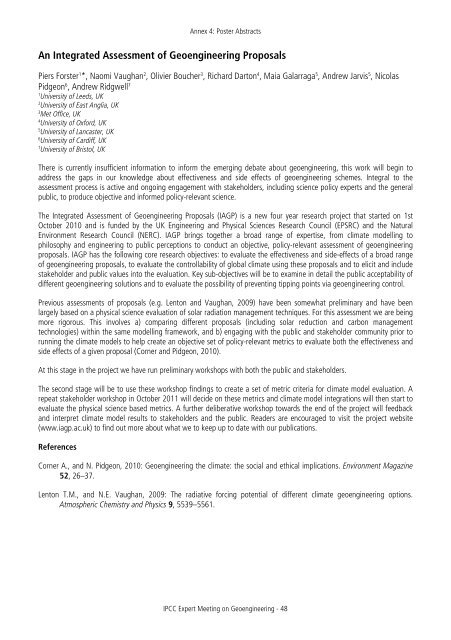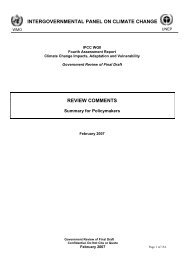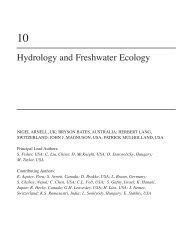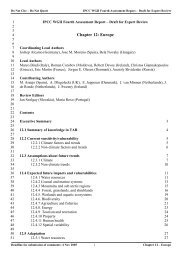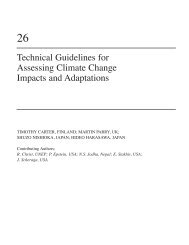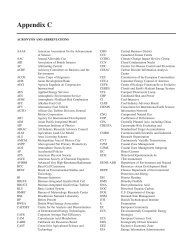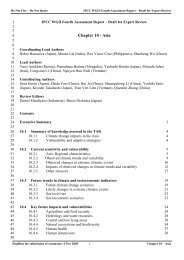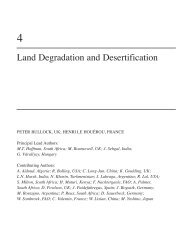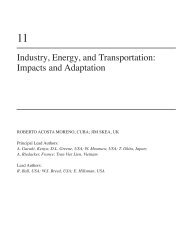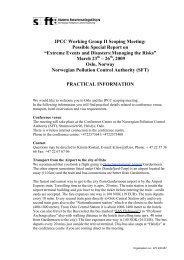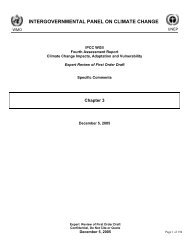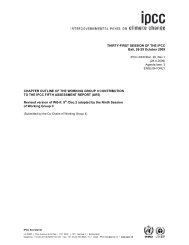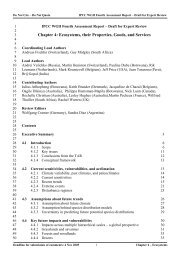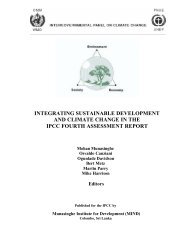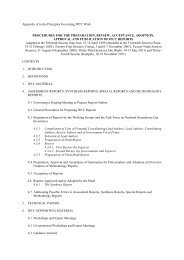IPCC Expert Meeting on Geoengineering
IPCC Expert Meeting on Geoengineering
IPCC Expert Meeting on Geoengineering
Create successful ePaper yourself
Turn your PDF publications into a flip-book with our unique Google optimized e-Paper software.
Annex 4: Poster Abstracts<br />
An Integrated Assessment of <strong>Geoengineering</strong> Proposals<br />
Piers Forster 1 *, Naomi Vaughan 2 , Olivier Boucher 3 , Richard Dart<strong>on</strong> 4 , Maia Galarraga 5 , Andrew Jarvis 5 , Nicolas<br />
Pidge<strong>on</strong> 6 , Andrew Ridgwell 7<br />
1<br />
University of Leeds, UK<br />
2<br />
University of East Anglia, UK<br />
3<br />
Met Office, UK<br />
4<br />
University of Oxford, UK<br />
5<br />
University of Lancaster, UK<br />
6<br />
University of Cardiff, UK<br />
7<br />
University of Bristol, UK<br />
There is currently insufficient informati<strong>on</strong> to inform the emerging debate about geoengineering, this work will begin to<br />
address the gaps in our knowledge about effectiveness and side effects of geoengineering schemes. Integral to the<br />
assessment process is active and <strong>on</strong>going engagement with stakeholders, including science policy experts and the general<br />
public, to produce objective and informed policy-relevant science.<br />
The Integrated Assessment of <strong>Geoengineering</strong> Proposals (IAGP) is a new four year research project that started <strong>on</strong> 1st<br />
October 2010 and is funded by the UK Engineering and Physical Sciences Research Council (EPSRC) and the Natural<br />
Envir<strong>on</strong>ment Research Council (NERC). IAGP brings together a broad range of expertise, from climate modelling to<br />
philosophy and engineering to public percepti<strong>on</strong>s to c<strong>on</strong>duct an objective, policy-relevant assessment of geoengineering<br />
proposals. IAGP has the following core research objectives: to evaluate the effectiveness and side-effects of a broad range<br />
of geoengineering proposals, to evaluate the c<strong>on</strong>trollability of global climate using these proposals and to elicit and include<br />
stakeholder and public values into the evaluati<strong>on</strong>. Key sub-objectives will be to examine in detail the public acceptability of<br />
different geoengineering soluti<strong>on</strong>s and to evaluate the possibility of preventing tipping points via geoengineering c<strong>on</strong>trol.<br />
Previous assessments of proposals (e.g. Lent<strong>on</strong> and Vaughan, 2009) have been somewhat preliminary and have been<br />
largely based <strong>on</strong> a physical science evaluati<strong>on</strong> of solar radiati<strong>on</strong> management techniques. For this assessment we are being<br />
more rigorous. This involves a) comparing different proposals (including solar reducti<strong>on</strong> and carb<strong>on</strong> management<br />
technologies) within the same modelling framework, and b) engaging with the public and stakeholder community prior to<br />
running the climate models to help create an objective set of policy-relevant metrics to evaluate both the effectiveness and<br />
side effects of a given proposal (Corner and Pidge<strong>on</strong>, 2010).<br />
At this stage in the project we have run preliminary workshops with both the public and stakeholders.<br />
The sec<strong>on</strong>d stage will be to use these workshop findings to create a set of metric criteria for climate model evaluati<strong>on</strong>. A<br />
repeat stakeholder workshop in October 2011 will decide <strong>on</strong> these metrics and climate model integrati<strong>on</strong>s will then start to<br />
evaluate the physical science based metrics. A further deliberative workshop towards the end of the project will feedback<br />
and interpret climate model results to stakeholders and the public. Readers are encouraged to visit the project website<br />
(www.iagp.ac.uk) to find out more about what we to keep up to date with our publicati<strong>on</strong>s.<br />
References<br />
Corner A., and N. Pidge<strong>on</strong>, 2010: <strong>Geoengineering</strong> the climate: the social and ethical implicati<strong>on</strong>s. Envir<strong>on</strong>ment Magazine<br />
52, 26–37.<br />
Lent<strong>on</strong> T.M., and N.E. Vaughan, 2009: The radiative forcing potential of different climate geoengineering opti<strong>on</strong>s.<br />
Atmospheric Chemistry and Physics 9, 5539–5561.<br />
<str<strong>on</strong>g>IPCC</str<strong>on</strong>g> <str<strong>on</strong>g>Expert</str<strong>on</strong>g> <str<strong>on</strong>g>Meeting</str<strong>on</strong>g> <strong>on</strong> <strong>Geoengineering</strong> - 48


